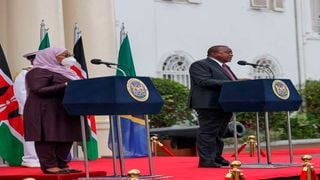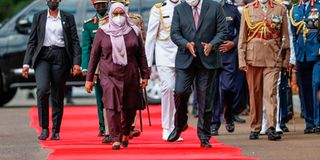
President Kenyatta and his Tanzanian counterpart Samia Suluhu Hassan address a joint press briefing at State House, Nairobi, yesterday. PHOTO | PSCU
| PSCUNews
Premium
Uhuru, Suluhu reset relations with big trade deals
What you need to know:
- Uhuru and Suluhu inked deal that they they hope will thaw icy relations and unlock trade ties.
- Two heads of state signed MoU in natural gas transportation, which Nairobi hopes will enhance “energy sufficiency.”
Kenya and Tanzania announced a number of trade deals on President Samia Suluhu’s first official visit to Nairobi, highlighting the two neighbouring countries’ readiness to turn the page on recent squabbles that have impeded cross-border flow of investments.
President Suluhu and her host, President Uhuru Kenyatta, yesterday listed crucial agreements they hope will thaw icy relations and unlock trade ties.
They signed a Memorandum of Understanding in natural gas transportation, which Nairobi hopes will enhance “energy sufficiency.” The deal will allow respective ministers to start negotiating the design, timelines and cost of a pipeline meant to deliver gas to Mombasa from Tanzania’s nascent natural gas industry.
Tanzania has an estimated 57 trillion cubic feet of natural gas in combined wells on mainland and offshore findings that could help Kenya ease its own access to what is seen as a cleaner source of energy for homes and industries.
But the country, under President Suluhu, must now work faster to agree its own revenue-sharing arrangements with foreign gas companies, crucial to ensure a pipeline can be laid.
Kenya and Tanzania on Tuesday signed a deal to start working on a gas pipeline from Dar es Salaam to Mombasa in what the two Presidents said was part of a long-term project to share energy resources.
“That should ease the cost of power to ensure that our industries can access cheaper energy that is also environmentally friendly,” President Kenyatta told a joint press conference at State House, Nairobi.
No timelines were given, but President Suluhu said respective technocrats have been directed to start working on the project immediately.
Key energy resources
“That is a long-term project and we’re thankful that today we have signed an agreement and what remains is implementation,” she said.
“We have agreed on the need to ease the transportation of key energy resources and we have reached one such understanding on the transportation of gas. What we need to do now is start implementing the project.”
A dispatch from State House said Nairobi is keen on gas importation as part of its wider programme to curb pollution by increasing usage of cleaner energy.
“Kenya is keen on importing natural gas from Tanzania to run our industries. Natural Gas is a clean energy source, which will contribute to the mitigation of greenhouse gas emissions and is in line with our commitment to reduce our carbon footprint and protect our environment,” the dispatch said.
The two leaders also signed an MoU on cooperation in culture, arts, social integration and national heritage.
“This will help us tap into our rich and diverse African cultures for the growth and transformation of our two countries,” the communiqué said.
President Suluhu is on her first State visit to Nairobi since she took power in March following the death of President John Pombe Magufuli.
The tour is laden with diplomatic significance, with businesses hoping that the two leaders’ cordiality will help sort out perennial cross-border trading difficulties.
Under President Magufuli, relations between Nairobi and Dar were marked by constant fights over tariff and non-tariff barriers.

President Uhuru Kenyatta receives Samia Suluhu Hassan, the President of Tanzania, at State House, Nairobi, on May 4, 2021.
Disputes on cattle straying over the long, porous border, burning of traders’ chicks and new levies on goods soured relations. The disputes made EAC meetings irregular, with the Heads of States Summit skipped for nearly two years before the one held in February, just before President Magufuli was taken ill.
Yesterday, the two leaders vowed to resume work on connecting infrastructure.
“We have agreed to speed up work on the main highway between Malindi through Lungalunga to Bagamoyo,” President Kenyatta said.
“We also agreed that we will work on resumption of transportation services on Lake Victoria, which were useful in movement of people and goods from Jinja to Kisumu and to Mwanza and Bukoba.”
President Kenyatta added that the two countries must build on their close cultural and historic ties to ensure the people benefit from interactions.
“We’re excited to welcome you here because we see you as our sister and Tanzania and Kenya are one thing,” President Kenyatta said.
“This time, we intend to go as far as strengthening our relations. My pledge is to continue working side by side with you to ensure the vision of our founding fathers is attained,” the Kenyan leader added.
He noted the countries’ common language, history and the fact that they had been initial creators of the East African Community.
Non-tariffs barriers
President Magufuli made the last such State visit to Kenya in 2016. It was also the last time a Joint Commission on Cooperation sat. The commission’s near-death allowed non-tariff barriers, such as a mismatch on Covid-19 certification, to crop up.
“We have agreed to continue addressing some of the challenges especially non-tariffs barriers that keep cropping up at our border points,” President Suluhu admitted.
“We agree that those challenges need to go and we directed that our Joint Commission on Cooperation should be sitting regularly to resolve these issues.
“Most important is for our ministers of Health to sit and agree on a harmonised protocol to ease movement and entry of our people.”
Tanzania is traditionally one of Kenya’s biggest trading partners in Africa, worth about Sh45 billion a year in volume of trade between them.
Some 513 companies from Kenya have invested in Tanzania with $1.7 billion worth of capital and employing some 51,000 Tanzanians. On the other hand, 30 Tanzanian firms have invested in Kenya worth Sh19 billion and employing 2,040 Kenyans.
With tensions between them, however, issues of work permits and other targeted restrictions have made it harder for Kenyans to do business in Tanzania. President Suluhu vowed to reverse the trend.
“I have pledged here today that Tanzanians will now come in full swing to invest here so we can grow our volume of trade.
“We have agreed on how we can grow trade and investment between us. As you may know, our countries have untapped potential in agriculture, industrialisation, fisheries, livestock keeping and tourism.”





